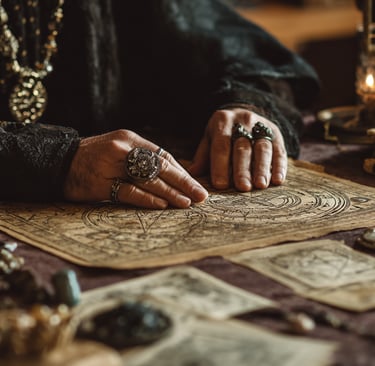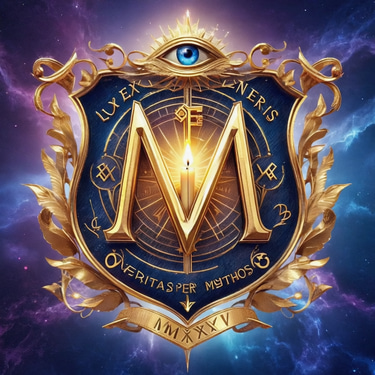

Divination: Ancient Wisdom in Modern Times
The practice of divination—seeking knowledge of the future or unknown through supernatural means—has captivated humanity for millennia. From the Oracle of Delphi in ancient Greece to today's tarot readers and astrologers, the human desire to glimpse beyond the veil of uncertainty remains as strong as ever. While skeptics dismiss it as superstition, millions worldwide continue to find meaning, guidance, and comfort in these ancient arts.
A Journey Through Time: The History of Divination
Divination appears in virtually every culture throughout history, suggesting something fundamental about human nature drives us to seek answers beyond the material world. Archaeological evidence shows that divination practices existed as early as 4000 BCE in ancient Mesopotamia, where priests would examine animal entrails to predict the future—a practice known as haruspicy.
The ancient Chinese developed the I Ching, or Book of Changes, around 3000 years ago, creating one of the world's most sophisticated divination systems. This complex method uses hexagrams formed by casting coins or yarrow stalks to provide guidance on life's challenges. Similarly, the Norse practiced rune casting, carving symbols onto stones or wood pieces and interpreting their patterns for insight.
Perhaps no ancient divination practice captures the imagination quite like the Oracle of Delphi. For over a thousand years, pilgrims traveled from across the Mediterranean to consult the Pythia, the high priestess who served as Apollo's mouthpiece. Her cryptic prophecies influenced major political and military decisions, demonstrating divination's profound impact on ancient society.
The Rich Tapestry of Divination Methods
Modern divination encompasses an astonishing variety of practices, each with its own symbolism, methodology, and cultural significance. Tarot cards, perhaps the most widely recognized form today, emerged in 15th-century Europe. The 78-card deck combines archetypal imagery with intuitive interpretation, allowing readers to explore psychological insights and potential future paths.
Astrology, one of the most enduring divination arts, maps the positions of celestial bodies to understand personality traits and predict future events. While Western astrology focuses on the zodiac's twelve signs, other cultures developed their own systems—Chinese astrology uses animal years in twelve-year cycles, while Vedic astrology incorporates complex mathematical calculations and spiritual philosophy.
Palmistry, or chiromancy, reads the lines, mounts, and shapes of hands to divine personality and destiny. Practitioners believe that our hands serve as maps of our souls, revealing everything from health predispositions to romantic compatibility. Similarly, numerology assigns mystical significance to numbers, particularly those derived from names and birth dates, to uncover hidden truths about individual paths and purposes.
More unusual forms include scrying—gazing into crystal balls, water, or mirrors to receive visions—and bibliomancy, which involves randomly opening books (often religious texts) and interpreting the passages found. Some practitioners read tea leaves, while others interpret the flight patterns of birds or the arrangement of thrown bones.
The Psychology Behind the Practice
From a psychological perspective, divination serves several important functions regardless of its supernatural validity. Carl Jung, the renowned psychologist, was fascinated by divination systems like the I Ching, viewing them as tools for accessing the unconscious mind. He believed these practices could reveal hidden aspects of the psyche and provide valuable self-reflection opportunities.
The process of divination often involves contemplation, meditation, and focused attention on specific questions or concerns. This mindful approach can help individuals clarify their thoughts, examine their motivations, and consider alternative perspectives they might otherwise overlook. In essence, divination can serve as a form of structured introspection.
The Barnum effect, named after circus showman P.T. Barnum, explains why people often find divination readings remarkably accurate. This psychological phenomenon describes our tendency to accept vague, general statements as highly personal and specific. Skilled practitioners often use this principle, consciously or unconsciously, to create meaningful experiences for their clients.
Additionally, divination can provide a sense of agency and hope during uncertain times. When facing difficult decisions or challenging circumstances, the ritual of consulting cards, charts, or other divination tools can help people feel more empowered and less alone in their struggles.
Contemporary Divination in the Digital Age
Rather than disappearing in our technology-driven world, divination has adapted and flourished online. Smartphone apps offer digital tarot readings, astrology websites generate personalized birth charts instantly, and social media platforms buzz with divination content. YouTube channels dedicated to tarot and astrology attract millions of subscribers, while TikTok's #WitchTok hashtag has garnered billions of views.
This digital transformation has democratized access to divination knowledge while creating new forms of practice. Online communities share techniques, interpretations, and personal experiences, fostering a global network of practitioners and enthusiasts. Virtual readings conducted over video calls have become commonplace, especially following the pandemic's impact on in-person services.
The rise of "secular divination" reflects another modern trend, where practitioners approach these systems as psychological tools rather than supernatural phenomena. This perspective attracts people who might otherwise dismiss divination as mere superstition, recognizing its value for self-reflection and decision-making without necessarily believing in magical properties.
Scientific Scrutiny and Ongoing Debate
The scientific community generally regards divination practices with skepticism, noting the lack of empirical evidence supporting supernatural claims. Controlled studies consistently fail to demonstrate that divination methods can predict future events better than random chance. Critics argue that perceived accuracy results from confirmation bias, selective memory, and the statistical probability that some predictions will occasionally prove correct.
However, researchers increasingly recognize divination's psychological and therapeutic benefits. Studies suggest that people who engage with divination practices often report reduced anxiety, increased self-awareness, and improved coping mechanisms. While these benefits don't validate supernatural claims, they highlight divination's potential value as a complementary wellness practice.
The placebo effect also plays a role—if someone believes a reading will provide helpful guidance, they may indeed experience positive outcomes through increased confidence and more thoughtful decision-making. This raises interesting questions about the relationship between belief, expectation, and reality in human experience.
Finding Balance: Wisdom and Caution
For those drawn to divination, approaching these practices with both openness and discernment proves essential. Used thoughtfully, divination can serve as a valuable tool for self-reflection, creative problem-solving, and stress management. The key lies in viewing readings as potential insights rather than absolute truths, maintaining personal agency while remaining open to different perspectives.
Potential practitioners should be aware of certain pitfalls, including over-dependence on readings for decision-making, financial exploitation by unscrupulous readers, and the risk of using divination to avoid taking responsibility for personal choices. Healthy engagement involves treating divination as one source of insight among many, not as a substitute for critical thinking or professional advice when needed.
Conclusion: The Enduring Appeal
Whether viewed as supernatural revelation or sophisticated psychology, divination continues to play a meaningful role in many people's lives. Its persistence across cultures and centuries suggests something valuable in the human drive to seek patterns, meaning, and guidance beyond the immediately visible world.
In our rapidly changing, often overwhelming modern world, divination offers a moment of pause, reflection, and possibility. It connects us to ancient wisdom traditions while providing tools for navigating contemporary challenges. While we may debate its mechanisms and validity, divination's ability to inspire introspection, hope, and personal growth ensures its continued relevance in human experience.
I Believe in Magic
© SDBEST LLC, 2025. All rights reserved.
Privacy Policy
Sponsorship Disclosure
Cookie Policy
Disclaimer
